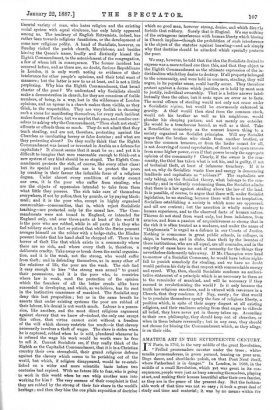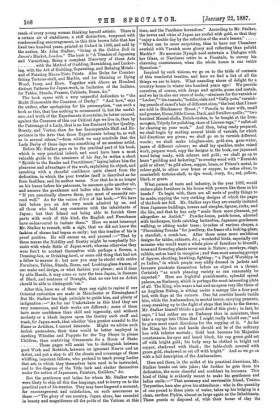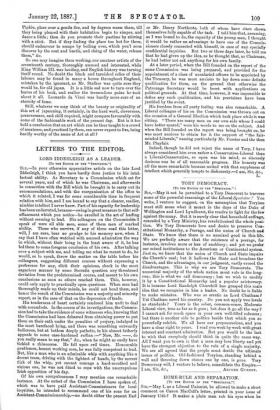AMATEUR ART IN THE SEVENTEENTH CENTURY.
IN Faris, in 1792, in the very middle of the great Revolution, "Frilled promenaders saunter under the trees ; white. muslin promenaderess, in green parasol, leaning on your arm. Dogs dance, and shoeblacks polish, on that Pont Neuf itself, where Fatherland is in danger." In London, in 1688, in the middle of a small Revolution, which yet was great in its con- sequences, people were just as busy amusing themselves, playing at art, and making their houses beautiful after their own fancies, as they are in the peace of the present day. But the fashion- able work of that time was not so easy ; it took a great deal of study and time and material; it was by no means within the
reach of every young woman thinking herself artistic. There is a certain air of stateliness, a stiff distinction, tempered with condescending encouragement, in this thin brown folio that has lived two hundred years, printed at Oxford in 1688, and sold by the author, Mr. John Stalker, "living at the Golden Ball in James's Market, London." The book is "A Treatise of Japaning and Varnishing, Being a compleat Discovery of those Arts with the Method of Guilding, Burnishing, and Lacker- ing, with the Art of Guilding, Separating, and Refining Metals : and of Painting Mezzo-Tinto Prints. Also Rules for Counter- feiting Tortoise-shell, and Marble, and for Staining or Dying Wood, Ivory, and Horn. Together with Above an Hundred distinct Patterns for Japan-work, in Imitation of the Indians, for Tables, Stands, Frames, Cabinets, Boxes, &c."
The book opens with a very respectful dedication to "the Right Honourable the Countess of Darby." "And how," says the author, after apologising for his presumption, "can such a book as this, that has nothing to recommend it, but the useful- ness, and truth of the Experiments it contains, be better secured, against the Censures of this our Critical Age we live in, than by the Patronage of a Lady, that is no less Eminent for her Quality, Beauty, and Vertue, than for her Incomparable Skill and Ex- perience in the Arts that those Experiments belong to, as well as in several others,"—from which we may conclude that the Lady Derby of those days was something of an amateur artist.
Before Mr. Stalker goes on to the practical part of his book, which is very practical indeed, and must have been a most valuable guide to the amateurs of his day, he writes a short "Epistle to the Reader and Practitioner," laying before him the pleasures and advantages of the work, explaining its object, and speaking with a cheerful confidence quite absent from the dedication, in which the poor treatise itself is described as far from faultless, and its author mean. Now that he is no longer on his knees before his patroness, he assumes quite another air, and assures the gentlemen and ladies who follow his rifles,— " If you punctually observe them, you must of necessity suc- ceed well." As for the raison d'elre of his book,—" We have laid before you an Art very much admired by us, and all those who hold any commerce with the inhabitants of Japan ; but that Island not being able to furnish these parts with work of this kind, the English and Frenchmen have endeavoured to imitate them." Here we must interrupt Mr. Stalker to remark, with a sigh, that we did not know the fashion of shams had begun so early ; but this treatise of his is proof positive. He will excuse us, and proceed :—" That by these means the Nobility and Gentry might be compleatly fur- nisht with whole Setts of Japan-work, whereas otherwise they were forc't to content themselves with perhaps a Screen, a Dressing-box, or Drinking-bowl, or some odd thing that had not a fellow to answer it : but now you may be stockt with entire Furniture, Tables, Stands, Boxes, and Looking-glass-frames, of one make and design, or what fashion you please ; and if done by able Hands, it may come so near the true Japan, in fineness of Black, and neatness of Draught, that no one but an Artist should be able to distinguish 'em."
After this, have we of these days any right to repine if our Oriental curiosities are made in Manchester or Birmingham ? But Mr. Stalker has high principle to guide him, and plenty of indignation :—" As for our Undertakers in this kind they are very numerous, and their works are different ; some of them have more confidence than skill and ingenuity, and without modesty or a blush impose upon the Gentry such stuff and trash, for Japan-work, that whether 'tis a greater scandal to the Name or Artificer, I cannot determin. Might we advise such foolish pretenders, their time would be better imployed in dawbing Whistles and Puppets for the Toy Shops to please Children, than contriving Ornaments for a Room of State.
These pages will assist 'em to distinguish between good Work and Rubbish, between an ignorant Knave and an Artist, and put a stop to all the cheats and cousenage of those whiffling, impotent fellows, who pretend to teach young Ladies that art, in which they themselves have need to be instructed, and to the disgrace of the Title lurk and shelter themselves under the notion of Japanners, Painters, Guilders," li;e.
But the gentlemen and ladies for whom Mr. Stalker wrote were likely to skip all this fine language, and to hurry on to the practical part of his treatise. They may have lingered a moment, for encouragement and satisfaction, on such assurances as these :—" The glory of one country, Japan alone, has exceeded in beauty and magnificence all the pride of the Vatican at this time, and the Pantheon heretofore." According to Mr. Stalker, the towns and cities of Japan are roofed with gold, so that they "enjoy a double day by the reflection of the sun's beams."
"What can be more sarprizing, than to have our Chambers overlaid with Varnish more glossy and reflecting than polisht Marble ? No amorous Nymph need entertain a Dialogue with her Glass, or Narcissus retire to a Fountain, to survey his charming countenance, when the whole house is one entire Speculum."
Inspired by such visions, we go on to the table of contents of this wonderful treatise, and here we find a list of all the things we are to learn. What unending stores of delight for a country-house in winter two hundred years ago ! We provide ourselves, of course, with drugs and spirits, gums and metals, and we lay in also our store of tools,—strainers for the varnish or " Lacker," " tin- tunnels," bottles, vials and "Gaily-pots," varnish- ing pencils of camel's hair of different sizes," the best that I know are sold in Blackamoor Street ;" "Pencils to draw with, small and greater, Goose, little Goose, Duck, and Swallow-quills ;" "two hundred Mussel-shells, Dutch-rushes, to be bought at the Iron- mongers, Tripoly for polishing, store of Linnen-rags," " sallet.oil for clearing up your work." And then, being ready prepared, we shall begin by making several kinds of varnish, for which full directions are given; we shall go on to varnish different woods ; we shall make isinglass-size, gold-size, gum-water, japan of different colours ; we shall lay speckles, make raised work, prepare wood, copy the designs in the book, our japanned wood being ready, with colours and gold; we shall go on to learn " guilding and lackering," to overlay wood with " Burnisht gold or silver," to gild silver, copper, brass, or Prince's metal, to colour gold, to silver over brass or copper, to refine silver, to counterfeit tortoise-shell, to dye wood, ivory, &c., red, yellow, black, or green.
What person of taste and industry, in the year 1688, would endure plain furniture in his house with powers like these in his hands ? To begin with, there are all sorts of pretty things to be made, copying the very striking designs of which the pages of the book are full. Mr. Stalker says they are exactly imitated from Japanese buildings, towers and steeples, figures, rocks, and the like, and that he has only "made them more pleasant, yet altogether as Antick." Powder-boxes, patch-boxes, adorned with landscapes, birds catching butterflies, Japanese gentlemen walking, or sitting under trees ; brushes of various shapes, a "Pincushing Trunke " for jewellery, the frame of a looking-glass, a standish, a comb-box. After these come more ambitious designs for tables, cabinets, &c. ; wonderful birds, especially one monster who would want a whole piece of furniture to himself; trees and flowering plants never seen in Nature ; monkeys, stags, rabbits, not so hard to recognise ; and then most amazing groups of figures, shooting, hawking, fighting ; "a Pagod Worshipp in ye Indies," in which people very oddly dressed in jackets and trousers prostrate themselves before an object on a throne. Certainly "as mach pleasing variety as can reasonably be expected." Here are frightful punishments, splendid spired palaces, an Embassy, which is perhaps the most interesting plate of al]. The King, who wears a hat and an apron very like those of an Anglican Bishop, is sitting under a canopy like a four-post bed, with flags at the corners. One fat courtier kneels beside him, while the Ambassadors, in mortal terror, carrying presents, creep sneaking up to the flight of steps that leads to the throne. Mr. Stalker himself thinks a good deal of this plate ; in fact, he says, "I had rather see an Embassy thus in miniature, than take a voyage into China that I might really behold one ;" and he gives most exact directions for the copying of it. "As for the King, his face and hands should not be of the ordinary hue with inferior mortals ; Gold best becomes his Majesties countenance, his eyes and beard black, his cap green gold set off with bright gold; his body may be clothed in bright red copper, shadowed with black ; the table-cloth covered with green gold, shadowed or set off with bright." And so we go on with a full description of the Ambassadors.
Here and there, in the midst of his practical directions, Mr. Stalker breaks out into jokes ; the further he gets from his dedication, the more cheerful and confident he becomes. This kind of thing is evidently meant to make his gentlemen and ladies smile :—" That necessary and serviceable friend, Venice. Turpentine, here also gives his attendance : who in the quantity of one pound to three pints of water, takes up his lodging in a clean, earthen Pipkin, almost as large again as the Inhabitants. These guests so disposed of, with their house of clay the Pipkin, place over a gentle fire, and by degrees warm them, till they being pleased with their habitation begin to simper, and dance a little; then do you promote their pastime by stirring with a stick. But if they finding the place too hot for them, should endeavour to escape by boiling over, which you'l soon discover by the rout and bustle, and rising of the water, release them," &c.
So one may imagine them working, our amateur artists of the seventeenth century, thoroughly amused and interested, while King William III. was landing, and English history was turning itself round. No doubt the black and tarnished relics of their labours may be found in many a house throughout England, mistaken by the ignorant, as Mr. Stalker was quite sure they would be, for old japan. It is a little sad now to turn over the leaves of his book, and realise the tremendous pains he took about it all. Leonardo da Vinci was hardly more sure of an eternity of fame.
Still, whatever we may think of the beauty or originality of this art of japanning, it certainly, in the hard work, cleverness, perseverance, and skill required, might compare favourably with some of the fashionable work of the present day. But is it too bold a conclusion that an art which can be thus taught to a crowd of amateurs, and practised by them, can never expect to live, being hardly worthy of the name of Art at all




































 Previous page
Previous page